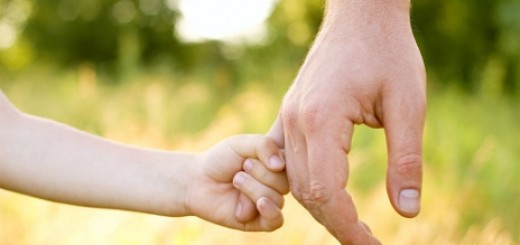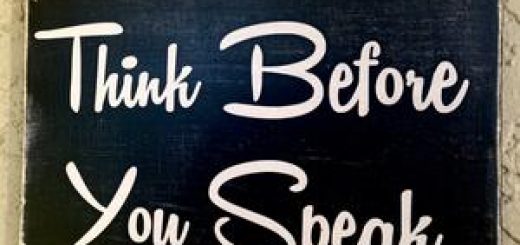Mistrust and stereotypes…….
So. Moving on.
The king is happy. He has a new queen. Esther is his new Queen of Hearts.
A plot to end his life has been thwarted. Esther and her uncle Mordecai are the heroes.
And now for some more political intrigue.
After these events, King Xerxes honoured Haman son of Hammedatha, the Agagite, elevating him and giving him a seat of honour higher than that of all the other nobles. All the royal officials at the king’s gate knelt down and paid honour to Haman, for the king had commanded this concerning him. But Mordecai would not kneel down or pay him honour.
Then the royal officials at the king’s gate asked Mordecai, ‘Why do you disobey the king’s command?’ Day after day they spoke to him but he refused to comply. Therefore they told Haman about it to see whether Mordecai’s behaviour would be tolerated, for he had told them he was a Jew.
When Haman saw that Mordecai would not kneel down or pay him honour, he was enraged. Yet having learned who Mordecai’s people were, he scorned the idea of killing only Mordecai. Instead Haman looked for a way to destroy all Mordecai’s people, the Jews, throughout the whole kingdom of Xerxes. Esther 3:1-6
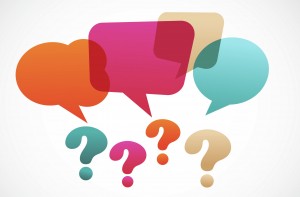 Why does the king honour Haman?
Why does the king honour Haman?
We don’t know.
Why does Mordecai refuse to kneel down and pay honour to Haman?
We don’t know.
Why is Haman set on exterminating the Jews?
We don’t know.
Maybe King Xerxes honours Haman because he wants a right hand man. He recognises something special about him and wants to reward that. He needs someone he can rely on. He’s asking for trouble though surely – showing favour to one only pleases the one and leaves everyone else feeling undervalued and envious.
 As for Mordecai, he is a Jew. A devout Jew. He will bow to no man. Only the one true God. Even if it gets him into trouble, as it surely will. (On a lighter note, this reminds me of Tony Hadley’s – of Spandau Ballet fame – refusal to act as a bellboy to other camp members in ‘I’m a Celebrity 2015’…..’I will undertake any challenge but I refuse to be a servant to anyone’. It didn’t end well for him either!)
As for Mordecai, he is a Jew. A devout Jew. He will bow to no man. Only the one true God. Even if it gets him into trouble, as it surely will. (On a lighter note, this reminds me of Tony Hadley’s – of Spandau Ballet fame – refusal to act as a bellboy to other camp members in ‘I’m a Celebrity 2015’…..’I will undertake any challenge but I refuse to be a servant to anyone’. It didn’t end well for him either!)
For Haman, this act of defiance cannot go unpunished. Merely killing Mordecai seems too small a retribution. He seeks to exterminate the entire Jewish population of the Persian empire. 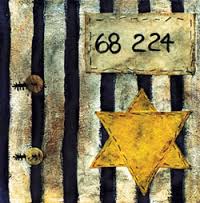 This story of the Book of Esther reminds us of how the Jewish people have suffered persecution and hatred throughout their history. The events of the holocaust in this century are a horrific continuation of this anti-Semitism.
This story of the Book of Esther reminds us of how the Jewish people have suffered persecution and hatred throughout their history. The events of the holocaust in this century are a horrific continuation of this anti-Semitism.
So what does all of this have teach us today?
Well, Haman’s actions are completely incomprehensible, aren’t they? To punish a whole nation for the actions of one man? That would never happen today.
Yeah, right. Are you for real? Of course it does. It happens all the time. We all do it. Yes, you. You obviously don’t make plans to exterminate a whole people, but if you were handed that kind of authority and power and confidence in your decisions and resources to carry through, who knows what you would end up doing?
 Because we’re all the same. We assign labels; we resort to stereotypes; we fall into prejudices. We group people together and judge them by the actions of one individual……..teenagers, asylum seekers, the Jews, travellers, the unemployed, white South Africans, white van drivers, women drivers, women, Christians, management…….the list could go on and on and on.
Because we’re all the same. We assign labels; we resort to stereotypes; we fall into prejudices. We group people together and judge them by the actions of one individual……..teenagers, asylum seekers, the Jews, travellers, the unemployed, white South Africans, white van drivers, women drivers, women, Christians, management…….the list could go on and on and on.
If we have been hurt by one individual, we avoid being hurt again by avoiding that whole group.
If someone has hurt us, we will punish everyone like them.
If we are scared by the actions of one individual, we will avoid ‘their sort’ in the future.
‘When I was 11, I had a really bad experience of church and now I will never ever set foot in a church again.’
‘After what he did to me, I will never trust another man again.’
‘I got really bad service in that shop today, so now I am boycotting all Morrisons.’
‘They all deserve to be punished for what has been done in the name of their religion.’
It’s natural on one level. A normal human response. Self preservation. We want to protect ourselves from getting hurt and scared again. Because being hurt and scared is horrible.
We all saw this after the events in Paris on Friday 13 November 2015. These bombings rocked the world. They were too close to home. They affected people like you and me. It could have been here. It could have been us. And for a brief while, it created an overwhelming response. People used the French flag on their Facebook profile to show they were standing with the people of Paris. People adopted the hashtag #prayforParis. Their hearts went out to the victims and survivors and their relatives and friends. And people turned on Muslims. They used it as a reason to reject refugees and ban the burqa. To look at all Muslims with suspicion. To post racist statuses on Facebook and think it was OK. That they deserved it. To feel justified in saying on air that we should kill the lot of them.
Which is exactly what terrorism is all about. Spreading terror and fear and inciting hatred and violence……And this is exactly what this man, Antoine Leiris, who lost his wife in the bombings, leaving their 17 month old son without a mother, is refusing to do –
So no, I don’t give you the gift of hating you. You are asking for it but responding to hatred with anger would be giving in to the same ignorance that made you what you are.
You want me to be afraid, to view my fellow countrymen with mistrust, to sacrifice my freedom for security.
You have lost.
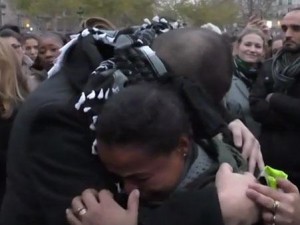 And exactly what this man, this Muslim man, this French man, felt he had to take a stand against in the Place de la Republique in Paris as the whole city mourned –
And exactly what this man, this Muslim man, this French man, felt he had to take a stand against in the Place de la Republique in Paris as the whole city mourned –
I am a Muslim, but I am told that I am a terrorist.
I trust you, do you trust me? If yes, Hug me.
Watch the video of this blindfolded Muslim man. It’s moving. Thought provoking.
Why did he feel the need to do this? Exactly because of what I’ve been saying.
Who is your Muslim? Which is the group of people you have judged on the actions of one individual? Or a few individuals? Or a few groups?
Who do you need to see as an individual? Who do you need to learn to trust? What stereotypes do you need to challenge?
Where do you need to set foot again?
Who do you need to find a way to embrace?
It is hard. It is risky.
But ultimately, it is life as it is meant to be lived.
